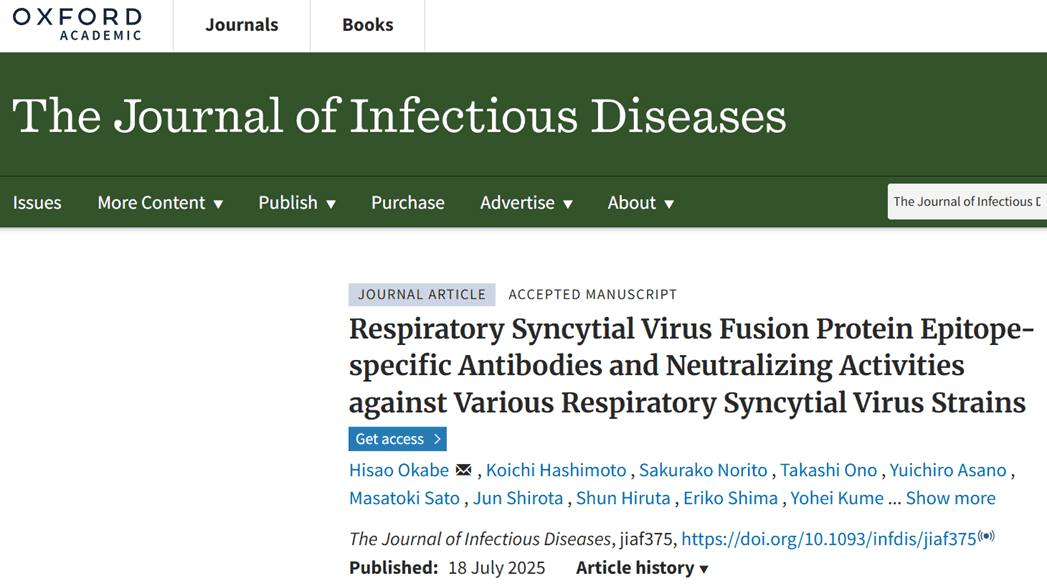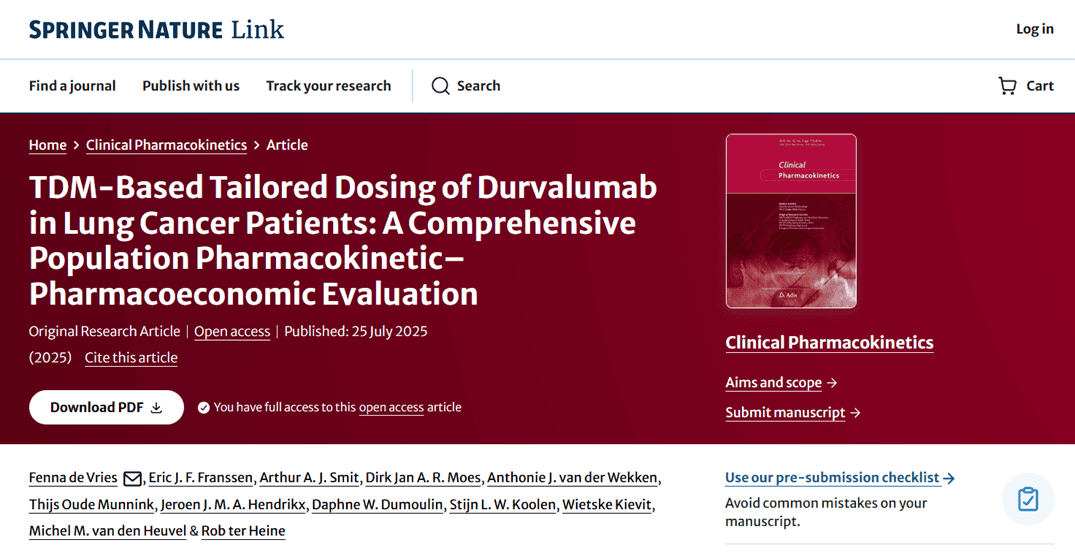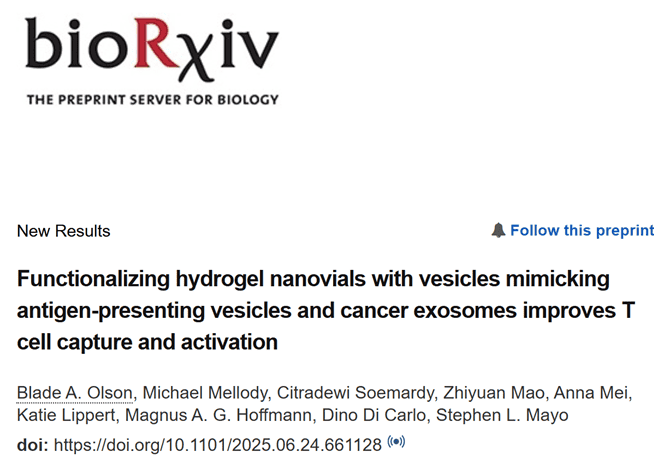abinScience continues to focus on cutting-edge applications of proteins and antibodies in disease research. Recent collaborative findings have been published in international journals such as The Journal of Infectious Diseases. Studies on respiratory syncytial virus fusion protein, lung cancer treatment, and hydrogel nanovials utilized high-quality tools provided by abinScience, offering robust support for key target discovery and mechanistic insights. This issue's literature highlights bring you the latest advancements in protein research for exploring disease mechanisms.
Title: Respiratory Syncytial Virus Fusion Protein Epitope-specific Antibodies and Neutralizing Activities against Various Respiratory Syncytial Virus Strains
Impact Factor: 4.5
Author Affiliation: Department of Pediatrics, Fukushima Medical University, Fukushima City, Japan

Published in The Journal of Infectious Diseases by the Okabe research team, this study investigates the levels of epitope-specific antibodies (ESA) targeting the major neutralizing epitopes (II, III, IV, V, O sites) of the respiratory syncytial virus (RSV) fusion protein (F protein) in the serum of healthy Japanese adults and their correlation with neutralizing activity (NA). Serum samples from 92 healthy adults (aged 28–75, mean 41.5 years) were analyzed using competitive enzyme-linked immunosorbent assay (ELISA) and neutralization tests to assess ESA and NA levels. Results showed significant differences in ESA levels across epitopes, with lower levels at sites IV and O (2.7 and 10.2 μg/mL) and higher levels at sites II, III, and V (41.9, 16.6, 35.3 μg/mL). NA levels varied with RSV subtype and mutations, with sites V and O showing the strongest correlation with NA. The study highlights that monitoring ESA levels and the evolution of the RSV F protein gene is critical for optimizing vaccines and monoclonal antibody therapies, providing key insights for RSV prevention strategies.
abinScience provided nirsevimab (targeting site O) monoclonal antibody (catalog number VK421026), which was used in competitive ELISA to precisely measure serum antibody levels against F protein epitopes. This was crucial for analyzing the relationship between epitope-specific antibodies and neutralizing activity, offering a key tool to elucidate the contributions of different epitopes to RSV infection resistance.
Title: TDM-Based Tailored Dosing of Durvalumab in Lung Cancer Patients: A Comprehensive Population Pharmacokinetic–Pharmacoeconomic Evaluation
Journal: Clinical Pharmacokinetics
Impact Factor: 4.0
Author Affiliation: OLVG Onze Lieve Vrouwe Gasthuis, Amsterdam, Netherlands

This study focuses on personalized dosing strategies for durvalumab in lung cancer patients based on therapeutic drug monitoring (TDM) to optimize efficacy and reduce costs. Durvalumab, an immune checkpoint inhibitor widely used in lung cancer treatment, may lead to overdosing and unnecessary costs with standard weight-based dosing. The study compared TDM-based dosing with traditional weight-based dosing using population pharmacokinetic and pharmacoeconomic models. Results showed that TDM reduced steady-state trough concentrations by 7–24%, drug exposure by 7.2%, and drug usage, saving approximately €67,152.50 annually. Compared to dose-banding strategies, TDM was superior in reducing drug exposure and costs. The study concludes that TDM-based dosing significantly enhances the cost-effectiveness of durvalumab treatment while maintaining efficacy, offering a potential optimization strategy for personalized lung cancer therapy.
abinScience provided the Durvalumab ELISA Kit (catalog number DV974038), used to measure durvalumab concentrations in patient plasma. This kit enabled precise drug level monitoring in the TDM strategy, helping researchers adjust dosing amounts and intervals to maintain effective drug levels (≥53.3 μg/mL) while avoiding overdosing. It supported pharmacokinetic analysis, providing reliable data to evaluate the efficacy and cost-effectiveness of different dosing strategies.
Title: Functionalizing Hydrogel Nanovials with Vesicles Mimicking Antigen-Presenting Vesicles and Cancer Exosomes Improves T Cell Capture and Activation
Author Affiliation: California Institute of Technology, USA

This study introduces a novel method to enhance T cell capture and activation by functionalizing hydrogel nanovials, focusing on the role of EABR-mediated antigen-presenting vesicles (APVs) in T cell immune responses. The research aims to improve the capture efficiency and activation of T cells and CAR-T cells to optimize immunotherapy. Experiments utilized HEK293T cells expressing EABR with NYESO1/HLA-A*0201 or HER2/CD54 complexes to prepare functionalized nanovials. Through flow cytometry and IFN-γ release assays, the study found that EABR-mediated nanovials significantly improved the capture efficiency of 1G4 T cells and activation levels of HER2 CAR-T cells compared to surfaces functionalized with recombinant proteins. The study concludes that EABR-APV nanovials mimic the “immune synapse” between antigen-presenting cells and T cells, providing an efficient tool for high-throughput single-cell studies and T cell therapies.
abinScience provided the 3M4E5 antibody (catalog number HM832023), compared with lab-made antibodies via ELISA to detect NYESO1/HLA-A*0201 complexes or immunomodulatory proteins, ensuring high specificity and reliability. This antibody was used to functionalize nanovial surfaces or as a capture/detection antibody, enhancing the precision of T cell capture and activation measurements. Its contribution supported high-throughput analysis of EABR-APV functionality, validating the nanovial platform’s effectiveness and providing a critical tool for developing more precise T cell immunotherapy strategies.
Literature Citation Reward Program
To express gratitude for the support and trust of researchers, abinScience is excited to launch a Literature Citation Reward Program! Whether you are a pioneer in life sciences or a dedicated lab researcher, if you publish in an SCI journal using abinScience products, you can apply for generous rewards!

 中文
中文 English
English





